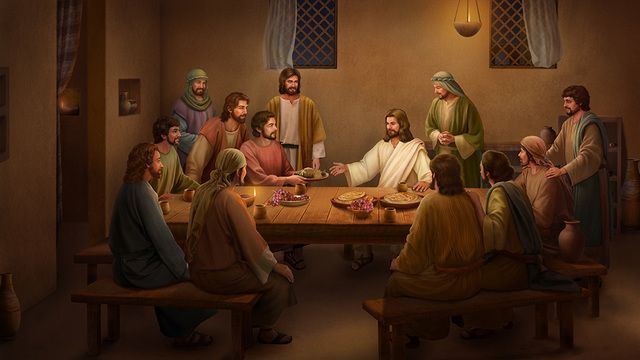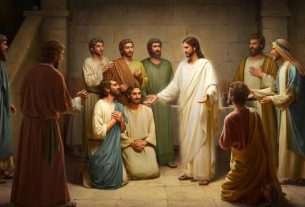Although the Lord Jesus was resurrected, His heart and His work had not left mankind. He told people with His appearance that no matter what form He existed in, He would accompany people, walk with them, and be with them at all times and in all places. And at all times and all places, He would provide to mankind and shepherd them, allow them to see and touch Him, and make sure they never again feel helpless. The Lord Jesus also wanted people to know this: Their lives in this world are not alone. Mankind has God’s care, God is with them; people can always lean on God; He is the family of every one of His followers. With God to lean on, mankind will no longer be lonely or helpless, and those who accept Him as their sin offering will no longer be bound in sin. In human eyes, these portions of His work that the Lord Jesus carried out after His resurrection were very small things, but the way I see it, every single thing was so meaningful, so valuable, and they were all so important and weighty.
Although the Lord Jesus’ time of working in the flesh was full of hardships and suffering, through His appearance in His spiritual body of flesh and blood, He completely and perfectly accomplished His work of that time in the flesh to redeem mankind. He began His ministry by becoming flesh, and He concluded His ministry by appearing to mankind in His fleshly form. He heralded the Age of Grace, He began the Age of Grace through His identity as Christ. Through His identity as Christ, He carried out the work in the Age of Grace and He strengthened and led all of His followers in the Age of Grace. It can be said of God’s work that He truly finishes what He starts. There are steps and a plan, and it is full of God’s wisdom, His omnipotence, and His marvelous deeds. It is also full of God’s love and mercy. Of course, the main thread running through all of God’s work is His care for mankind; it is permeated with His feelings of concern that He can never put aside. In these verses of the Bible, in every single thing that the Lord Jesus did after His resurrection, what was revealed was God’s unchanging hopes and concern for mankind, as well as God’s meticulous care and cherishing of humans. Until now, none of this has changed—can you see it? When you see this, doesn’t your heart just automatically become close to God? If you lived in that age and the Lord Jesus appeared to you after His resurrection, in a tangible form for you to see, and if He sat in front of you, ate bread and fish and explained the scriptures to you, spoke with you, then how would you feel? Would you feel happy? How about guilty? The previous misunderstandings and avoidance of God, the conflicts with and doubts of God—wouldn’t they all just disappear? Wouldn’t the relationship between God and man become more proper?
Through interpretation of these limited chapters of the Bible, did you discover any flaws in God’s disposition? Did you discover any adulteration of God’s love? Did you see any craftiness or evil in God’s omnipotence or wisdom? Certainly not! Now can you say with certainty that God is holy? Can you say with certainty that God’s emotions are all a revealing of His essence and disposition? I hope that after you have read these words, what you’ve understood from it will help you and bring you benefits in your pursuit of a change in disposition and a fear of God. I also hope that these words will bear fruit for you that grows by the day, thus in the process of this pursuit bringing you closer and closer to God, bringing you closer and closer to the standard that God requires, so that you are no longer bored of the pursuit of the truth and you no longer feel that the pursuit of the truth and of a change in disposition is a troublesome or a superfluous thing. It is, rather, the expression of God’s true disposition and the holy essence of God that motivate you to long for the light, to long for justice, and to aspire to pursue the truth, to pursue the satisfaction of God’s will, and to become a man gained by God, to become a real person.
Today we’ve talked about some things that God did in the Age of Grace when He was incarnated for the first time. From these things, we’ve seen the disposition that He expressed and revealed in the flesh, as well as every aspect of what He has and is. All these aspects of what He has and is seem very humanized, but the reality is that in essence, all that He revealed and expressed is inseparable from His own disposition. Every method and every aspect of God incarnate expressing His disposition in humanity is inextricably linked with His own essence. So, it is very important that God came unto mankind in the way of incarnation and the work that He did in the flesh is also very important. And, the disposition that He revealed and the will that He expressed are even more important to every person living in the flesh, to every person living in corruption. Is this something that you’re able to understand? After understanding God’s disposition and what He has and is, have you made any conclusions as to how you should treat God? In response to this question, in conclusion I’d like to give you three admonishments: First, do not test God. No matter how much you understand about God, no matter how much you know about His disposition, absolutely do not test Him. Second, do not contend for status with God. No matter what type of status God gives you or what kind of work He entrusts you with, no matter what kind of duty He raises you up to perform, and no matter how much you have spent and sacrificed for God, absolutely do not compete for status with Him. Third, do not compete with God. No matter whether you understand or if you can obey what God does with you, what He arranges for you, and the things He brings to you, absolutely do not compete with God. If you can carry out these three admonishments, then you will be relatively safe, and you will not anger God easily. That’s all to share for today!
July 23, 2014




